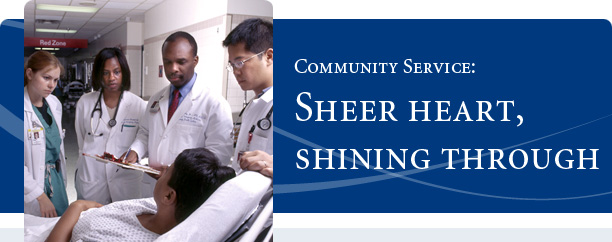

 This past March, a charter bus carrying an Ohio college baseball team en route to Florida plunged over an overpass and landed on another interstate below. When the Emory physician who directs emergency medical services for Grady Memorial Hospital arrived on the site as primary triage officer, he found passengers who had been ejected when the bus hit the overpass barrier, others who were thrown when the bus landed on the highway below, others wounded inside the crumpled vehicle. Four students, the bus driver, and his wife died at the site, and another died later.
This past March, a charter bus carrying an Ohio college baseball team en route to Florida plunged over an overpass and landed on another interstate below. When the Emory physician who directs emergency medical services for Grady Memorial Hospital arrived on the site as primary triage officer, he found passengers who had been ejected when the bus hit the overpass barrier, others who were thrown when the bus landed on the highway below, others wounded inside the crumpled vehicle. Four students, the bus driver, and his wife died at the site, and another died later. From the CEO>>
Previous chapter: Patient Care: Creating a new model of health and healing<<
Main Menu
Printer friendly
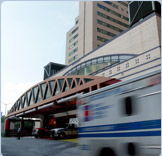 physicians in The Emory Clinic, Emory University Hospital, Emory Crawford Long Hospital, Emory Children’s Center, and Wesley Woods Center provide tens of millions of dollars in charity care in addition to unreimbursed care provided in affiliated facilities such as Grady Memorial Hospital. |
||
Make a gift
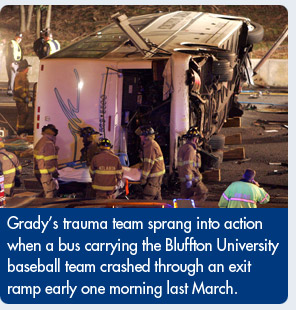 They saved lives, comforted families, handled an army of reporters, and also cared for the endless stream of regular patients. Times like this, when the sheer heart of Emory medical faculty shines through most dramatically, serve as a reminder of the steady contributions they make to the community all throughout the year.
They saved lives, comforted families, handled an army of reporters, and also cared for the endless stream of regular patients. Times like this, when the sheer heart of Emory medical faculty shines through most dramatically, serve as a reminder of the steady contributions they make to the community all throughout the year.
Lifeline to a struggling public hospital
While Grady Memorial Hospital, struggles to provide care to ever-growing numbers of uninsured patients despite a persistently flat budget, Emory continues to provide essential lifelines to this long-time affiliate. Emory medical faculty and residents make up 85% of the physicians at Grady, with Morehouse School of Medicine providing the remaining 15%. These physicians provide a substantial amount of charity care to Grady patients. In addition, any reimbursement received for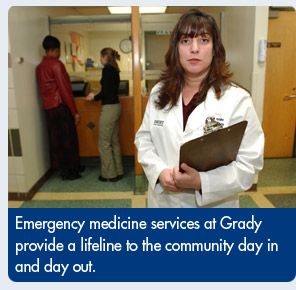 Emory physician services to Grady patients who do have Medicare or other coverage is invested back into Grady via the Emory Medical Care Foundation.
Emory physician services to Grady patients who do have Medicare or other coverage is invested back into Grady via the Emory Medical Care Foundation.
Moreover, Emory specialists make Grady unique in a variety of ways. They offer specialty care (in the hospital’s burn unit, for example) that is unavailable elsewhere in the area. Other services that keep Grady in the forefront of medical care include the most comprehensive AIDS program in the country, a regional perinatal center for high-risk moms and babies, a sickle cell center named an NIH Center of Excellence, a nationally lauded TB control program, Georgia’s first and only lupus registry, and the Georgia Cancer Center of Excellence clinic.
New ties with an old partner
Children’s Healthcare of Atlanta at Egleston has been affiliated with Emory’s medical school and staffed primarily by Emory pediatricians throughout its history. But this relationship was strengthened last year when the Emory Children’s Center (the largest pediatric multispeciality group practice in Georgia)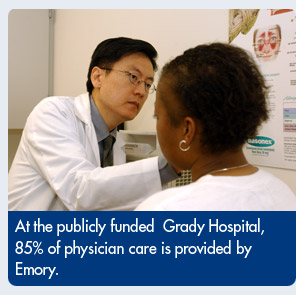 entered into a joint venture with Children’s Healthcare to create a joint faculty physician practice plan.
entered into a joint venture with Children’s Healthcare to create a joint faculty physician practice plan.
The relationship between the Emory and Children’s Healthcare was further enhanced last year when the latter assumed operation of the pediatric hospital on the Grady Hospital campus where Emory pediatricians have long provided care. Shortly thereafter, Children’s Healthcare announced plans to build a new facility for this hospital, which is expected to open in 2009.
New outreach to older adults
Last year, as in every year, thousands of elderly patients came to Emory as inpatients or outpatients. But last year, for the first time, Emory clinicians went to some of them via a new tele-psychiatry program launched by the Fuqua Center for Late-Life Depression.
The center’s mission is to improve community awareness regarding depression in older adults while improving their access to treatment. The new program uses video-conferencing to connect Emory psychiatrists to older adults living in rural and underserved communities, many of whom otherwise would not enter or remain in treatment because of distance. Patients who call the Fuqua Center in Atlanta are given the option of going to one of more than 30 sites equipped for telemedicine at various locations throughout Georgia. There, a nurse remains in the room until each session is completed, and family members and the patient’s general practitioner also can be present if desired.
Preparing for catastrophe
One of the recommendations of a task force created last year to examine how Emory University and Emory Healthcare would respond to pandemic flu or other threats was formation of a new office to improve the ability to deliver a coordinated and effective response to all hazards, including natural disasters, human-caused catastrophic events, and public health emergencies. The new Office of Critical Event Preparedness and Response (CEPAR) opened in May, headed by an emergency medicine physician and involving many other medical faculty. Designed to orchestrate a unified and effective response to catastrophic events, CEPAR bridges Emory’s catastrophe-related resources, from health care to security to communications, and enhances collaborations with community partners such as sister health care institutions and the U.S. Centers for Disease Control and Prevention.
Reaching out to the world community
The medical school has long been involved in international outreach, including faculty work in the Eurasian nation of Georgia, which have been vital in building the medical education and health care system there. Projects like this recently have been undergirded by Emory’s new Global Health Institute (GHI), a university-wide initiative intended to extend and amplify Emory’s impact on worldwide health and healing.
been undergirded by Emory’s new Global Health Institute (GHI), a university-wide initiative intended to extend and amplify Emory’s impact on worldwide health and healing.
This year, the GHI provided funds to the medical school for a research project focusing on improving global control of tuberculosis. The project is focusing on new drugs, new diagnostics, and an effective vaccine as well as research training for physicians and scientists in Zambia. Faculty in infectious diseases are working closely with colleagues in the Rollins School of Public Health to partner with colleagues in a medical school and teaching hospital in that country to address this serious threat to global health.